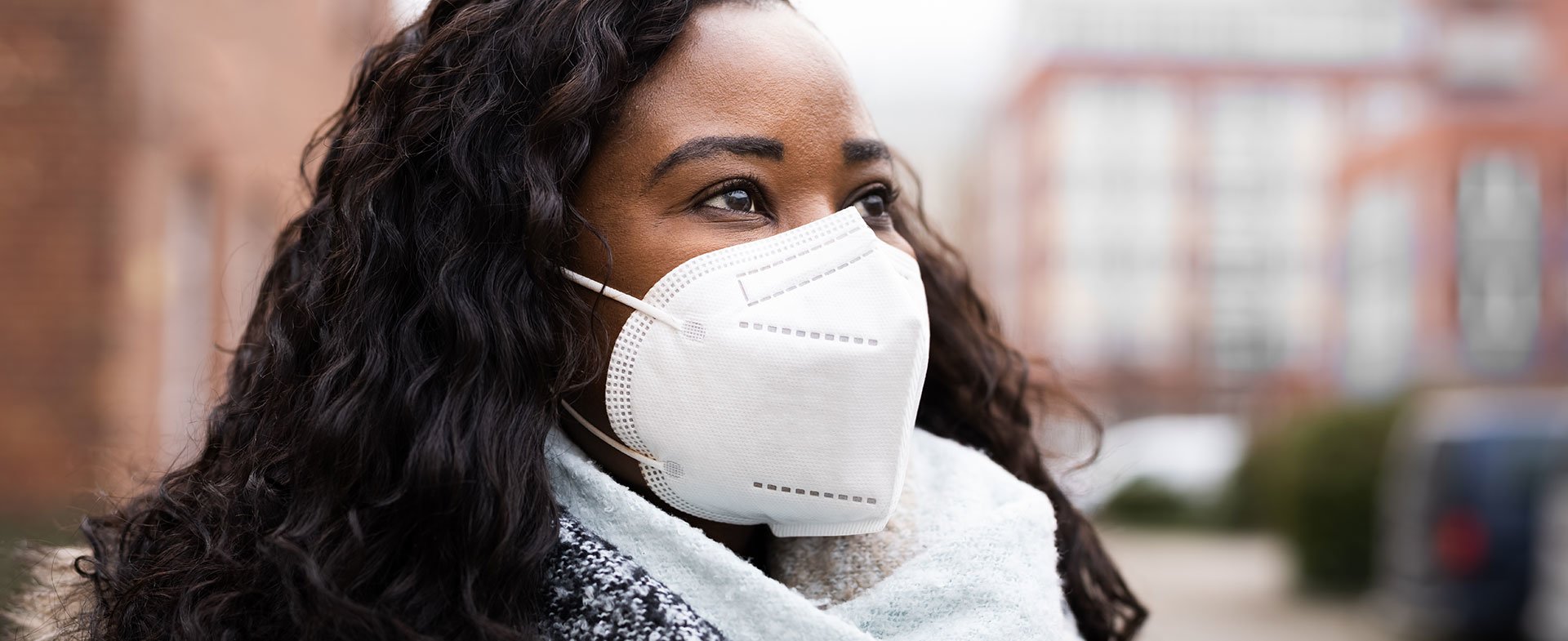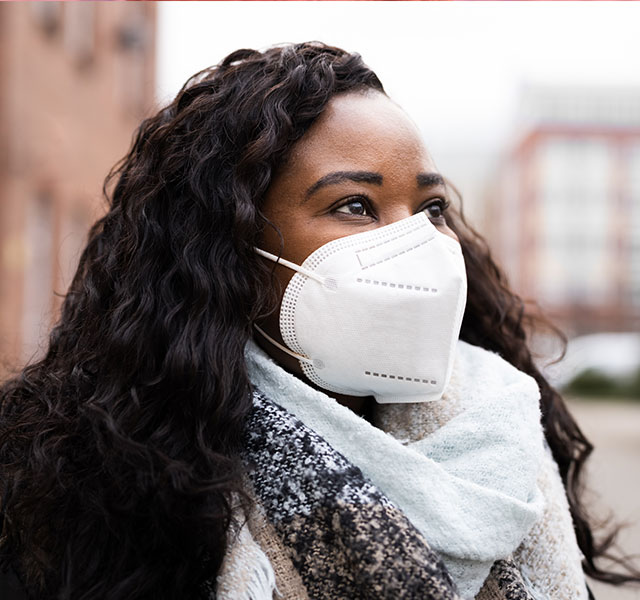The latest COVID-19 variant, Omicron, has been surging around the country. It now accounts for the majority of COVID-19 cases in the United States. This mutation of COVID-19 seems to have different characteristics than the original strain: in general, the severity, symptoms, transmissibility, and incubation period differ.
The Omicron variant might be milder than the original strain of COVID-19, but it’s also more contagious. And it still has the potential to be severe—especially for those who are unvaccinated.
“In the midst of this Omicron surge, if you are not vaccinated (or haven’t gotten your booster yet, which is now authorized for everyone ages 12 and up) you should do so right away,” says Jennifer Burgess, D.O., a primary care physician with Henry Ford Health. “Combined with masking and social distancing, it’s the most effective way to protect yourself and others.”
Here, Dr. Burgess shares what we know about Omicron. One note: Because this variant is new, what we know is based upon anecdotal reports. As more research about Omicron is gathered, information may change or become more definitive.
Q: How severe is Omicron? What are the symptoms?
A: So far, Omicron seems to cause a milder illness than the original strain of COVID-19. It also seems to be milder than the Delta variant. “Omicron doesn’t replicate well inside the lungs. It tends to stay in the nose, throat and upper airways, making it similar to a common cold,” says Dr. Burgess. “Common symptoms of the Omicron variant include a cough, fatigue, congestion, sore throat, headache and a runny nose. Loss of smell and taste—which has been a key identifier of the original strain of COVID-19—seems to be an uncommon symptom with the Omicron variant.”
This, however, does not mean that you won’t become severely ill with Omicron—especially if you aren’t vaccinated. Part of what makes COVID-19 a severe illness is how your immune system reacts to it. Many people who have lingering symptoms after COVID-19 had an immune system that went into overdrive, where their immune system attacked their body’s own organs.
“Ongoing research will tell us more about whether Omicron is indeed milder,” says Dr. Burgess. “And even if it is, I urge everyone not to become lax about protecting themselves from COVID-19—getting vaccinated, masking and social distancing is still important. We are still in the thick of a pandemic.”
Q: Do the vaccines work against the Omicron variant?
A: If you’re vaccinated, it’s possible to get a breakthrough infection (which happens when those who are fully vaccinated contract COVID-19). But if you’re fully vaccinated, you’re much less likely to experience a severe infection. And if you’ve had a booster dose, you’re even less likely to experience a severe infection. However, it’s still recommended that everyone—vaccinated or not—continues to social distance and wear masks in public.
And the type of mask you wear is important. “Surgical and cloth masks do not appear to be as effective in Omicron prevention,” says Dr. Burgess. “KN95 and N95 masks are better options.”
Q: How contagious is the Omicron variant?
A: The Omicron variant is more contagious than the Delta variant—and the Delta variant is twice as transmittable as the original strain of COVID-19.
The Omicron variant also has a shorter incubation period. On average, the incubation period for Omicron is three days, which is less than the average incubation period for Delta, which is four days, and the original strain of COVID-19, which is five days.
“An incubation period is the period of time between contracting a virus and having symptoms,” says Dr. Burgess. “The difference among these incubation periods has to do with how each variant attaches itself to the cells. Because Omicron has a shorter incubation period, you’ll experience symptoms more quickly and you can spread it to others more quickly. You can also spread it to others during the incubation period, before you even develop symptoms.”
With COVID-19, you’re most contagious the few days before and after experiencing symptoms. As the virus continues through its course, you become less contagious.
Q: How does the Omicron variant affect children under five who can’t yet be vaccinated?
A: At this point, it seems like Omicron is milder in children, just as it is in adults. However, this doesn’t mean that children can’t be severely affected by Omicron. The more Omicron spreads, the more likely it is that more children will be hospitalized with COVID-19, just because of its prevalence.
Vaccines for kids under five are still being studied, and hopefully they’ll be available soon—maybe by spring.
Q: What should I do if I have COVID-19, or if I’ve been exposed to COVID-19?
A: Because of the way Omicron spreads—and because research has showed us that the majority of COVID-19 transmission occurs in the first two days before the onset of symptoms, and within three days after—the CDC changed its isolation guidelines for those who contract COVID-19:
- If you contract COVID-19, you should isolate for five days. If you are asymptomatic, or your symptoms are resolving (and you’re without a fever for 24 hours), you can come out of isolation as long as you wear a mask for five days when around others.
- If you are not asymptomatic, or your symptoms are not resolving, you should continue to isolate after the five-day mark.
The CDC has also updated its quarantine guidelines for those who are exposed to COVID-19:
- If you are unvaccinated, or you’ve had your second Pfizer or Moderna vaccine more than six months ago (or your first Johnson & Johnson vaccine more than two months ago) and you aren’t boosted, you should quarantine for five days after being exposed to COVID-19. After that, you should wear a mask for an additional five days when around other people. If you can’t quarantine for five days, you should wear a well-fitting mask when around others for 10 days.
- If you’ve received your booster shot, you don’t need to quarantine after being exposed to COVID-19, but you should wear a mask for 10 days after being exposed.
- If possible, it’s a good idea to get tested at day five after exposure. If you experience symptoms, you should quarantine until you receive a negative test result.
But even with these guidelines in mind, Dr. Burgess recommends erring on the side of caution.
“It seems that the CDC guidelines are fluid and constantly changing, which makes it challenging to know what to do,” says Dr. Burgess. “If it is feasible, I personally would still recommend 10 days of quarantine from the onset of symptoms. For questions about the latest recommendations, reach out to your primary care doctor.”
For answers to questions about COVID-19 vaccines and booster doses, visit henryford.com/coronavirus/vaccine-faqs.
To find a doctor at Henry Ford, visit henryford.com or call 1-800-436-7936.
Dr. Jennifer Burgess is a family medicine doctor seeing patients at Henry Ford Medical Center in Commerce Township and West Bloomfield.



